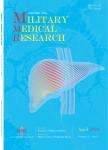An ongoing search for potential targets and therapies for lethal sepsis
An ongoing search for potential targets and therapies for lethal sepsis作者机构:Department of Emergency Medicine North Shore University Hospital The Feinstein Institute for Medical Research 350 Community Drive Department of General Surgery Tangdu Hospital The 4th Military Medical University Department of Ophthalmology University of Alabama at Birmingham
出 版 物:《Military Medical Research》 (军事医学研究(英文版))
年 卷 期:2015年第3卷第3期
页 面:145-155页
学科分类:1004[医学-公共卫生与预防医学(可授医学、理学学位)] 1002[医学-临床医学] 100401[医学-流行病与卫生统计学] 10[医学]
基 金:supported by grants from the National Center of Complementary and Alternative Medicine (NCCAM, R01AT005076) the National Institute of General Medical Sciences (NIGMS, R01GM063075)
主 题:Innate immune cells Pathogen-associated molecular pattern molecules High mobility group box 1 Herbal components Sepsis Autophagy Endocytosis Double-stranded RNA-activated protein kinase R
摘 要:Sepsis, which refers to a systemic inflammatory response syndrome resulting from a microbial infection, represents the leading cause of death in intensive care units. The pathogenesis of sepsis remains poorly understood although it is attributable to dysregulated immune responses orchestrated by innate immune cells that sequentially release early(e.g., tumor necrosis factor(TNF), interleukin-1(IL-1), and interferon-γ(IFN-γ) and late(e.g., high mobility group box 1(HMGB1)) pro-inflammatory mediators. As a ubiquitous nuclear protein, HMGB1 can be passively released from pathologically damaged cells, thereby converging infection and injury on commonly dysregulated inflammatory responses. We review evidence that supports extracellular HMGB1 as a late mediator of inflammatory diseases and discuss the potential of several Chinese herbal components as HMGB1-targeting therapies. We propose that it is important to develop strategies for specifically attenuating injury-elicited inflammatory responses without compromising the infection-mediated innate immunity for the clinical management of sepsis and other inflammatory diseases.



